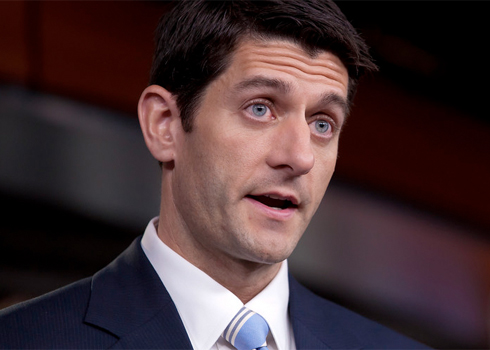Speaking in broad terms Monday before the Economic Club of Chicago, House Budget Committee chairman Paul Ryan (R-WI) defended his controversial proposals to slash entitlement spending and privatize Medicare.
Though billed as an effort to revamp his widely criticized budget, Ryan avoided describing his health care plans in specific detail, eschewing even the friendly terms he and other Republicans have used to explain it since he first unveiled it earlier this year. Instead, Ryan reframed the entitlement cuts in his budget as “strengthen[ing] welfare for those who need it,” and accused Democrats who have attacked his budget as engaging in class warfare.
The House budget would phase out the existing Medicare program and replace it with a new program to provide future retirees with private insurance subsidies, which would shrink in value over time relative to steeply rising health care costs. This stands in contrast to the fairly broad consensus among Democrats that health care costs are best reined in by altering provider incentives and placing some restrictions on government-financed health care services, while allowing Medicare to remain a single-payer program for all beneficiaries.
Ryan characterized this distinction differently.
“If I could sum up that disagreement in a couple of sentences, I would say this: Our plan is to give seniors the power to deny business to inefficient providers. Their plan is to give government the power to deny care to seniors,” he said, according to prepared remarks.
In an exceedingly rare move for a senior Republican, Ryan acknowledged that President Obama inherited a badly damaged economy and a federal budget headed for crisis. And he even obliquely defended the unpopular 2008 TARP legislation– which he voted for — as a necessary action to mitigate the financial crisis. But he said that Obama’s actions since taking office have made things worse than if the administration had pursued status quo policies.
“I am not disputing for a moment that he inherited a difficult fiscal situation when he took office. He did,” Ryan said. “But subsequent interventions – such as the President’s stimulus law and the Fed’s unprecedented monetary easing – have done much more harm than good, in my judgment. In the aftermath of the crisis, we needed government to repair the free-market foundations of the American economy, as it did under Reagan in the early 1980s, by restraining spending… keeping taxes low… enforcing reasonable, predictable regulations… and protecting the value of the dollar.”
Ryan’s remarks come as vulnerable Republicans, and Republican presidential candidates, grapple with his plan’s unpopularity. His budget is thought to have tossed a special election in a conservative New York district into play, and Republican presidential hopefuls are delicately trying to balance their opposition to the plan with the fact that it’s the official position of Republicans in Congress.
Former House Speaker Newt Gingrich attacked the plan as “right-wing social engineering” on Sunday, but has partially walked back that critique. Asked about Gingrich’s position, Ryan said “With allies like that, who needs the left?”










